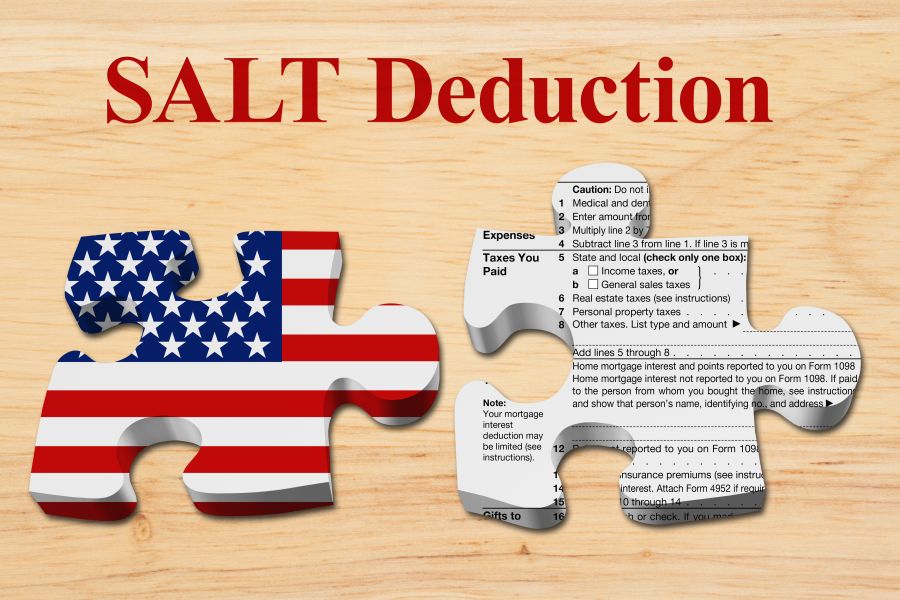Don’t let the holiday rush keep you from considering some important steps to reduce your 2021 tax liability. You still have time to execute a few strategies. Purchase assets Thinking about buying new or used equipment, machinery or office equipment in the new year? Buy them and place them in service by December 31, and you can deduct 100% of the cost as bonus depreciation. Contact us for details on the 100% bonus depreciation break and exactly what types of assets qualify. Bonus depreciation is also available for certain building improvements. Before the 2017 Tax Cuts and Jobs Act (TCJA), bonus depreciation was available for two types of real property: land improvements other than buildings (for example fencing and parking lots), and “qualified improvement property,” a broad category of...

The Infrastructure Investment and Jobs Act (IIJA) was signed into law on November 15, 2021. It includes new information reporting requirements that will generally apply to digital asset transactions starting in 2023. Cryptocurrency exchanges will be required to perform intermediary Form 1099 reporting for cryptocurrency transactions. Existing reporting rules If you have a stock brokerage account, whenever you sell stock or other securities, you receive a Form 1099-B after the end of the year. Your broker uses the form to report transaction details such as sale proceeds, relevant dates, your tax basis and the character of gains or losses. In addition, if you transfer stock from one broker to another broker, the old broker must furnish a statement with relevant information, such as tax basis, to the...
The Employee Retention Tax Credit (ERTC) was a valuable tax credit that helped employers survive the COVID-19 pandemic. A new law has retroactively terminated it before it was scheduled to end. It now only applies through September 30, 2021 (rather than through December 31, 2021) — unless the employer is a “recovery startup business.” The Infrastructure Investment and Jobs Act of 2021 (IIJA 2021), which was signed by President Biden on November 15, 2021, doesn’t have many tax provisions but this one is important for some businesses. If you anticipated receiving the ERTC based on payroll taxes after September 30 and retained payroll taxes, you must determine how and when to repay those taxes and address any other compliance issues. The American Institute of Certified Public Accountants (AICPA)...
For years, banks, financial service and investment companies, and exporters have been required to follow know-your-customer (KYC) processes to thwart criminal activity. Developed to help certain businesses comply with anti-money laundering and anti-terrorism regulations, these programs aren’t mandated for most nonfinancial businesses. But you might want to consider adopting some KYC principles anyway. They can help you prevent fraud — including occupational fraud and identity theft — and even boost your marketing and sales efforts. Enhanced due diligence As part of their KYC processes, financial institutions generally verify customers’ names, addresses, and dates of birth and check them against lists of known criminals. In addition, they monitor transaction trends and high-risk accounts to determine their risk and whether they merit filing suspicious activity reports with the government....
(This is Blog Post #1132)...
Do you have a tax-saving flexible spending account (FSA) with your employer to help pay for health or dependent care expenses? As the end of 2021 nears, there are some rules and reminders to keep in mind. An account for health expenses A pre-tax contribution of $2,750 to a health FSA is permitted in 2021. This amount is increasing to $2,850 for 2022. You save taxes in these accounts because you use pre-tax dollars to pay for medical expenses that might not be deductible. For example, they wouldn’t be deductible if you don’t itemize deductions on your tax return. Even if you do itemize, medical expenses must exceed a certain percentage of your adjusted gross income in order to be deductible. Additionally, the amounts that you contribute...
As posted to the Now You Know YouTube Channel on 11/5/2021 (Run Time 29 min, 54 sec, when starting at time code 3:22) Now You Know sits down with legendary automotive engineer Sandy Munro in November 2021 to compare and contrast today's unfolding Chinese EV rollout with the Japanese vehicle invasion of the 1970s and 1980s. On the Chinese EV business model, Sandy comments, "We're playing checkers . . . one move at a time. They're playing chess. If you're business plan is geared toward the book 'The Art of War', you'll win." (This is Blog Post #1130) Sandy Munro is an automotive engineer who specializes in machine tools and manufacturing. He joined the Ford Motor Company in 1978 and then started his own consulting company, Munro & Associates,...
Recent pass-through entity (PTE) tax (AB-150) clarifications from the Franchise Tax Board (FTB) underscore that detailed planning is critical when considering this credit. For an overview of AB-150, also see our initial 8/15/21 post on this subject: "California AB-150 Provides SALT Cap Workaround". PTE Election The election to pay the tax is: made annually, is irrevocable, and can only be made on an original, timely filed return, including extensions PTE Tax Due Date (2021 Tax Year) For the initial year the PTE tax credit concepts exists (2021) the tax is due by original due date of the 2021 tax year return, without regard to extensions. For calendar-year taxpayers, that is March 15, 2022. Logistics of PTE Tax Payments / K-1 Recipient Credits Prior to the original due date of the tax...
The holiday season will soon be here. At this time of year, your business may want to show its gratitude to employees and customers by giving them gifts or hosting holiday parties again after a year of forgoing them due to the pandemic. It’s a good time to brush up on the tax rules associated with these expenses. Are they tax deductible by your business and is the value taxable to the recipients? Gifts to customers If you give gifts to customers and clients, they’re deductible up to $25 per recipient per year. For purposes of the $25 limit, you don’t need to include “incidental” costs that don’t substantially add to the gift’s value. These costs include engraving, gift wrapping, packaging and shipping. Also excluded from the...
The COVID-19 pandemic has put unprecedented stress on private business owners. Some are now considering selling their businesses. Before putting your business on the market, it’s important to prepare it for sale. Here are six steps to consider. Clean up the financials Buyers are most interested in an acquisition target’s core competencies, and they usually prefer a clean, simple transaction. Consider buying out minority investors who could object to a deal and removing nonessential items from your balance sheet. Examples of items that could complicate a sale include underperforming segments, non-operating assets and shareholder loans. Sales are often based on multiples of earnings or earnings before interest, taxes, depreciation and amortization (EBITDA). Do what you can to maximize your bottom line. That includes cutting extraneous expenses...
- 1
- 2
- 3
- 4
- 5
- 6
- 7
- 8
- 9
- 10
- 11
- 12
- 13
- 14
- 15
- 16
- 17
- 18
- 19
- 20
- 21
- 22
- 23
- 24
- 25
- 26
- 27
- 28
- 29
- 30
- 31
- 32
- 33
- 34
- 35
- 36
- 37
- 38
- 39
- 40
- 41
- 42
- 43
- 44
- 45
- 46
- 47
- 48
- 49
- 50
- 51
- 52
- 53
- 54
- 55
- 56
- 57
- 58
- 59
- 60
- 61
- 62
- 63
- 64
- 65
- 66
- 67
- 68
- 69
- 70
- 71
- 72
- 73
- 74
- 75
- 76
- 77
- 78
- 79
- 80
- 81
- 82
- 83
- 84
- 85
- 86
- 87
- 88
- 89
- 90
- 91
- 92
- 93
- 94
- 95
- 96
- 97
- 98
- 99
- 100
- 101
- 102
- 103
- 104
- 105
- 106
- 107
- 108
- 109
- 110
- 111
- 112
- 113
- 114
- 115
- 116
- 117
- 118
- 119
- 120
- 121
- 122
- 123
- 124
- 125
- 126
- 127
- 128
- 129
- 130
- 131
- 132
- 133
- 134
- 135
- 136
- 137
- 138
- 139
- 140
- 141
- 142
- 143
- 144
- 145
- 146
- 147
- 148
- 149
- 150
- 151











